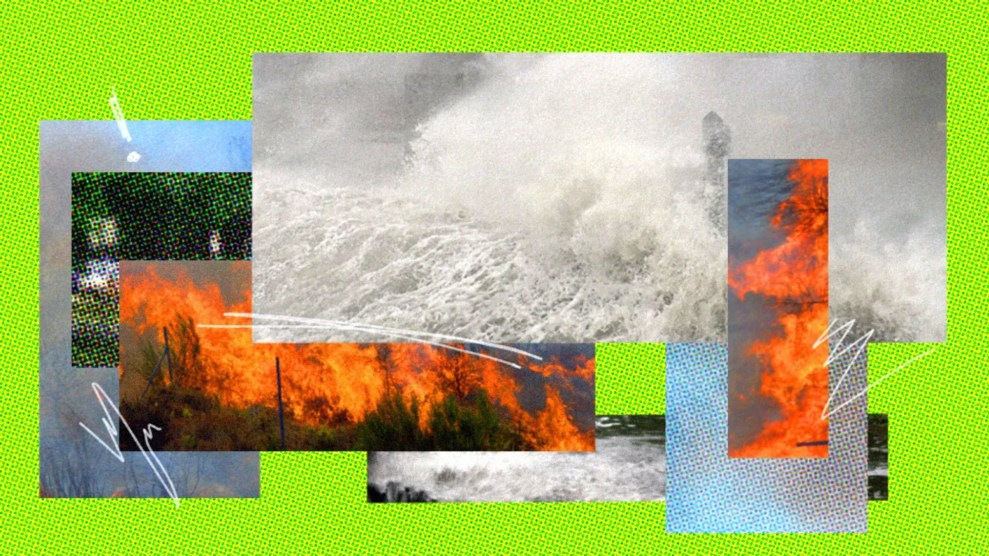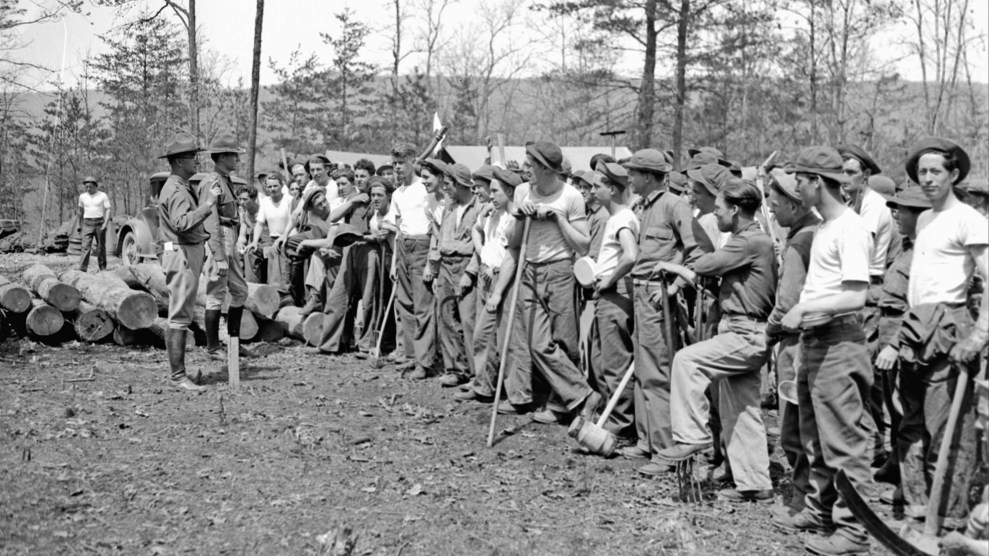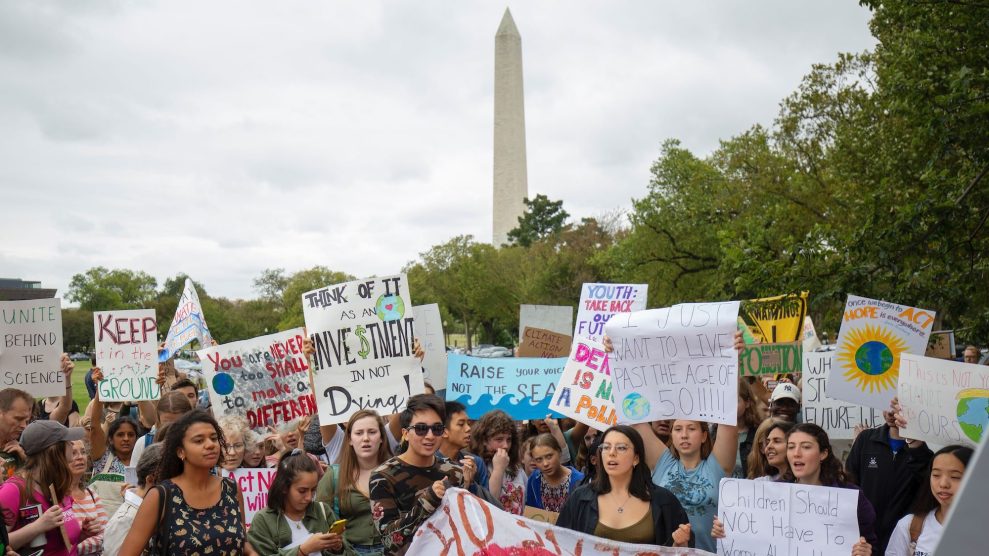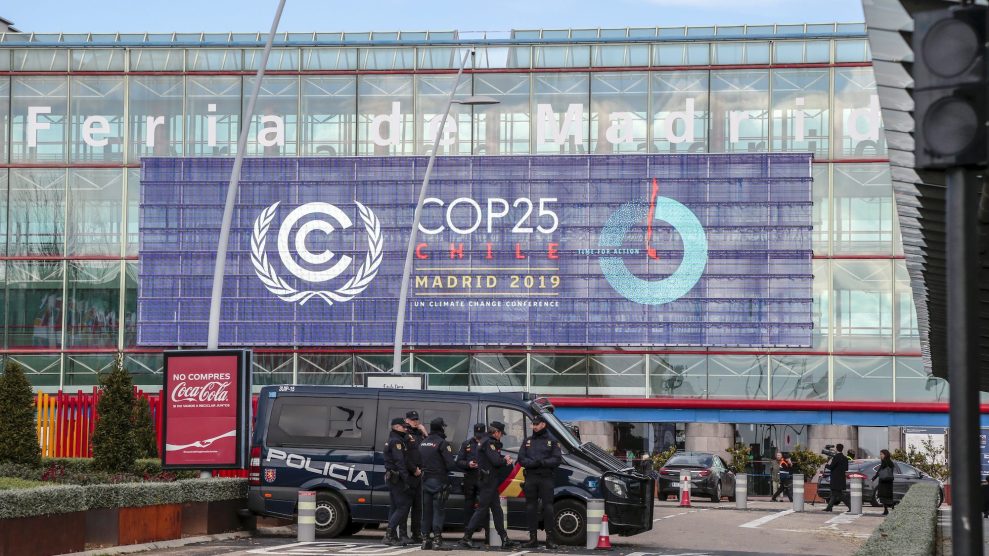
Liz Coulbourn/Teen Vogue
This story originally appeared in Teen Vogue and is republished here as part of Covering Climate Now, a global journalism collaboration strengthening coverage of the climate story.
Watching An Inconvenient Truth in your middle-school science class. Hearing Greta Thunberg’s calls to join weekly school strikes. Driving away from smoldering wildfires engulfing dry California hillsides. These are some of the moments that made young people realize the climate crisis will define their lives—and the future of human life on Earth.
We’ve heard the facts so many times that it’s easy to become numb to them: The world is steadily growing warmer, certain parts of the world are facing extreme droughts or floods, many wildlife populations are shrinking—and things are only projected to grow worse, with carbon emissions rising and countries contributing to mass deforestation. Despite these emergencies, many politicians, including Arkansas Senator Tom Cotton and Florida Senator Marco Rubio, deny the reality of climate change. And the Western world, particularly the United States, is currently the biggest contributor to the climate crisis. Though the climate crisis is affecting everyone on Earth, its effects have been particularly felt by those living in the global south, lower-income people, and younger people, whose futures are being shaped by how we handle the crisis.
These overarching facts are important to reiterate. But it’s also critical to understand what climate change feels like on an everyday level—how it affects our mental and physical health. It’s a problem so enormous and disorienting that it’s often easier to just shove it into the darker corners of our minds, where we don’t want to look. Living under the specter of climate change can make it feel surreal to try to plan an education, a career, a family, or any concrete aspect of your future.
That’s why younger generations have risen up, calling on global leaders to treat our rapidly changing climate like the emergency it is. Teen Vogue heard from more than 80 young people about how they imagine the climate crisis might define their future. A selection of their responses is below, condensed and lightly edited for clarity.
In eighth grade, we learned about the sea levels rising in Florida, and that Florida could go partially underwater because of this. When the teacher told me this, fear plagued my body and I immediately started making plans to move out of Florida when I became a college student. Seven years later, however, and I’m still here. I’ve definitely become more sustainable in my own way since then. I started going second-hand shopping more often and started a community garden with my friends a few years ago. Some things that give me hope are going to beach clean-ups and the many sustainability options that people use in downtown Tampa Bay, such as solar panels and other energy management systems.” —Ariana Matondo, Tampa, Florida, 19, college student
I live in Texas, so the recent winter-storm outage has scared people around me and made us want to take matters into our own hands. I am a coordinator for mutual aid efforts in the Austin area, and seeing people share funds, housing those in need, and sharing food and water has brought me so much hope when seeing how we can help those who are victims of climate disaster. Through social media and listening to community leaders, I am educating myself on how to live a low-waste life and having discussions with those around me to take small steps in living sustainably. —Delina, Houston, Texas, 21, college student
I go through moments of realizing that this will define my future, but it’s hard to understand that fully. When I was 21, I remember having a moment [in which] I learned that climate change is irreversible. COVID has been an exercise in learning that crisis happens slowly. In the past few years, NYC has been reclassified into a subtropical climate. That has been scary. I feel anger at those in power. I feel fear for my family members in the developing world. —Ace, Brooklyn, New York, 28, astrologer
Unlike some of my friends, I don’t feel a lot of anger towards older generations. I think people conjure up very stereotypical ideas of old people that they can be mad about. But my parents didn’t do this. My grandparents didn’t do this. They are poor laborers. Certain members of the older generation were more responsible than others, and we can be mad at some of them. I just want them to understand how very serious this is and how important it is to act now. The longer we wait, the harder it will be. So even though they won’t be around, say, 40 years from now, they still can and should join with us in trying to fix this problem, for their kids and grandkids. —Mariana, El Paso, Texas 17, high-school student
My hometown has experienced two ‘once-in-a-lifetime’ natural disasters in my lifetime—first, a flood in 2008 and next, a ‘derecho’ inland hurricane in 2020. Seeing homes underwater, roofs torn off, and more, really hit home that the effects of climate change aren’t just happening in coastal areas or deserts—it can happen in Iowa too. Of course, the impacts of these disasters are most felt by those who are non-white or low income: when a city floods, those living on higher elevations can often emerge relatively unscathed, and during the derecho, those with stronger roofs who could afford to get them replaced or repaired more often experienced less damage to their homes. —Kiran Misra, Cedar Rapids, Iowa, 24, Government Partnerships Officer at the World Food Programme
We were getting ready for planting season with my dad on the farm but the rains delayed us for weeks, while in other parts of the country, they were experiencing a drought. The lack of rain was just the first among many effects of climate change that I’ve experienced since then. I’ve participated in clean-ups, changed my daily routine—especially in the amount of plastic I buy, reuse, and recycle—and also started a blog on how to be sustainable in Kenya. I’ve learned that responsible consumption and production goes a long way. —Gloria Kisilu, Nairobi, Kenya, 25, entrepreneur
As someone with a South Asian heritage, this hits me harder than it might others. It’s well-known that climate change is disproportionately affecting those who are the least able to deal with it. People I know, friends and family overseas, are being affected by this. In the west, climate change is posed as a futuristic apocalypse—but climate change is actively destroying homes, crops, and livestock. It’s destroying lives. —Tanusha Singh Patel, Brighton, UK, 17, college student
As long as I can remember, there have been different campaigns in Mexico City to raise awareness for the lack of water, but they made it seem like it was a remote possibility in the distant future. But when I was in middle school, we couldn’t wash our hands or go to the bathroom some days because the district didn’t have water. That was the moment I realized the lack of water was already happening and at a worse rate than they made us believe. —Monica, Mexico City, 24, biomedical engineer
I was a junior in high school when the BP oil spill happened, and I remember arguing with my more ignorant classmates about the effects of the spill and why it mattered for the governor to close the beaches along the Panhandle. Florida is not safe when it comes to climate change, and it will only get more unsafe as things get worse. Given our senior population, major weather events and rising temperatures are deadly, and our Republican legislature doesn’t care. But we have a president again who knows that climate change is a threat. We also have politicians who understand what a threat it really is and the structural problems that make tackling climate change difficult and are committed to fighting it. The legions of climate change activists are moving the Overton window [of what’s politically possible], and that’s really great. —Rebecca, Florida, 28, political organizer
Seeing creative ways to live more sustainably has brought me hope. I’m disabled, and a lot of the methods are just so work- and time-consuming that I’m not able to do it. I can’t afford to eat vegan and I don’t have access to some options. But I’m realizing that little things in my everyday life, like using a reusable water bottle and other small things, are useful. Ultimately, I know the best thing I can do is pressure corporations and lawmakers. —Molly, Minneapolis, Minnesota, 23, administrative assistant
I first learned what climate change was in policy debate in ninth grade. Debaters spoke about it as if it would be one big catastrophic day that we wouldn’t expect. They were talking about the importance of STEM education in schools so that students could grow up to become leaders in climate policy. This past February, when Texas was suddenly hit with a winter storm, I realized climate change wouldn’t happen in the distant future—t’s happening now. Being stranded in my apartment for three days with my grandmother in the cold and in the dark with no food and water, realizing that nobody was coming to save us—these were the climate disasters we argued about in debate.
I’m going off to college soon, but I wonder how this will affect the rest of my family who have no choice but to live in the south. The conversation has been the same since President Obama: reduce carbon emissions. That’s not it…at least not all of it. How are we going to make infrastructures in the south better prepared for floods? How are we going to hold corporations accountable? Why do people have to suffer for us to learn these lessons? —Nia, Houston, Texas, 18, high-school student
The climate disaster defined my life when Hurricane Sandy hit Long Island, my home, in 2012. I was 17 at the time, and it really dawned on me how everything can come to a standstill when we don’t invest in our infrastructure for future climate disasters. Becoming a labor organizer two years ago has helped me better develop these thoughts and feelings, and it helped me want to reach out and do more in my own way. —Michael, New York, 25, writer and labor organizer
I often get frustrated when white people talk on climate change because it’s always them trying to sell you an industry—veganism, bamboo utensils, metal straws—without talking about corporate emissions, returning land to Natives, the fossil fuel industry, and the impact on poor communities. —EF Newsome, Los Angeles, California, 24, coordinator at a record label
I like to compare climate change to a computer tab at the top of your screen; you’re aware that it’s there, and may keep it open for weeks saying, ‘Oh yeah, I should probably get to that,’ and never do. Up until I was 14 or 15, climate change was this little tab in my brain; I knew it was an issue but didn’t know the magnitude of it all. Especially with the lack of climate education in schools, many students remain unaware of the severity of the state of our planet. I, among others, took our own time to watch documentaries, read articles and scientific papers, along with our good friend Google. —Katie Robertson, Frederick, Maryland, 18, high-school student
Living through Hurricane Katrina was a big moment for me—just seeing the city underwater and knowing that probably within my lifetime, much of the area where I grew up would be uninhabitable. Then, when I was in high school, I was put onto corticosteroids for severe asthma. I grew up right by gas and petrochemical refineries in Louisiana’s “Cancer Alley.” That point in high school was when I realized that the climate crisis wasn’t something I’d be able to escape by moving away from southern Louisiana. It would live in my body forever. Nearly 10 years later, I was diagnosed with endometriosis, which is also tied to pollution. Even if we somehow miraculously start to address the climate crisis, my health problems, and those of so many other people, won’t go away. —Nina Haug, St. Rose, Louisiana, 26, law student
The Land Back movement brings me hope. Native people’s knowledge of how to sustain the earth’s relationship to human life has been kept and passed on even through many centuries of capitalist colonizers committing genocide. I donate to Native activists and their causes and in general move the capital I can get my hands on into Native people’s lives. I work on my own relationship with my local environment and gardening practices. People are fleeing from the effects of climate change now, but we are going to need people-led food solutions because the government has proven it cannot be counted on to steward our food resources. —Deeana, 30, US, sex worker and poet
I feel like I grew up hearing about Greenpeace, saving the whales, polar bears needing ice floes, and how important composting is. In terms of the actual science of climate change—the icebergs melting, the seas rising, and such—I probably became aware of that in middle school. It was several more years before I made the connection between climate change and capitalism/the global economy/imperialism.
I remember trying to explain to my parents a year or two ago how omnipresent and generationally defining climate change feels. I was talking about how I don’t see myself ever having children or retiring because I think the world is going to change so rapidly in the next few decades, and I don’t want to be responsible for raising a child in that world even though I desperately want to be a parent, and I don’t know that there will be a functional world to retire to. I think they understood somewhat, but my dad kept saying that every young generation feels like it’s going to be the last one.
I was, and still am, so angry. When I give myself the space to be scared, I’m scared, but it feels so pointless that I don’t usually let it happen. I don’t buy into the personal-responsibility solution to climate change, where, if we all shower every other day instead of daily and bring reusable bags to the grocery store and bike to work once a week instead of driving, everything will be okay. Seeing people around me of all ages radicalize themselves and one another, waking up to the effects of capitalism and imperialism, and asking, ‘What the f**k are politicians even doing for us?’ is what gives me hope. For anything to get better, everything has to change. —Mae, Seattle, 25, assistant manager at a homeless shelter















